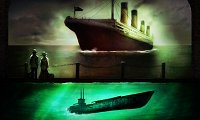 InterGalactic Medicine Show #53, November 2016
InterGalactic Medicine Show #53, November 2016
“Not on the Gallows” by Harry Turtledove
Reviewed by Michelle Ristuccia
Lucas and Stella board a liner to London, ignoring ill omens to chase a business venture in “Not on the Gallows” by Harry Turtledove. This alternate history piece tells a tale of overconfidence as endemic to human nature, and readers who know anything about history will guess the name of the ill-fated ship. Turtledove smoothly lays out the political and physical realities of the time, down to the .303 caliber used in England versus the USA’s .30-06. Perhaps as an artifact of her culture, Stella presents as the dutiful wife who nags her husband but bides by his final decisions. And while Lucas has a big personality, it does little to save him from the strong currents of fate.
In “The Fairy Godfather” by Time McDaniel, nephew Frankie stirs up trouble in an attempt to reconcile his uncle, the Godfather fairy, and his aunt, the Fairy Godmother of legend. But without Frankie’s intervention, the Fairy Godfather is headed for a hard fall fueled by his pride and lack of life balance. Interestingly, McDaniel’s fairies value physical punishment over emotional.
“Carry On, Torus” by Gregor Hartmann answers the question, what would an uber-rich English gentleman do if he was the last man in the universe? Luckily for Andrew Woozer, he has his nigh-all-powerful AI, Torus, to look after him. This first-person narrative will make readers laugh-out-loud as the AI solves the problems we’re used to our protagonists tackling, and Andrew manages to live and comment on his life as if he’s not stranded on a comet.
Michael Meyerhofer brings us a gorgeously strange, inexplicable emotional-religious experience in “Turncrowe,” a first-person fantasy narrative following mercenary Crowe as he guards a long-dead saint from pious peasants and a raving duke. Turncrowe’s humanly sympathetic character feels complex from the start, and proves such as we learn more about him, so that by the end we are rooting for him to accomplish the impossible. Meyerhofer sends the message that tragedy, both personal and universal, need not stop a person from experiencing and doing beautiful things, and that those positive experiences do not invalidate the trauma of the past. An inspiring period story of human resilience and bravery, with a tie-in with Greek mythology for bonus points.
In “It Becomes You” by Laura-Marie Steele, Archie has privately taken a stand against his generation’s most common moral sin, ushered in by good ole scientific progress (cyborgs) and its unintended consequences. Now he lays dying of Huntington’s Disease in a care home, and as a well-meaning nurse questions his relationship with his mother, he lets go of the family (and industry) secret that keeps him from reconciling with his brother and finding peace within himself. Steele uses her unreliable narrator and the readers’ underlying genre expectations to create a convoluted mystery that defies prediction. Archie’s interactions with his mother show the hallmarks of a dysfunctional family, including the unspoken rule of secrecy, reinforced by shame and emotional pain that serve to keep family members in old patterns—until Archie realizes he’s compromising his driving goal, to protect his brother Thomas’ right to be himself.
Death and Life gamble their powers before the creation of the world in “Why Death is Silent” by William Fischer. Fisher successfully employs the trappings of oral tradition—such as repetition—to tell a short tale hearkening back to the beginning of all things, balanced with a touch of modernism in humorous details.
Michelle Ristuccia enjoys slowing down time in the middle of the night to read and review speculative fiction, because sleeping offspring are the best inspiration and motivation. You can find out more about her other writing projects and geeky obsessions by visiting her blog.